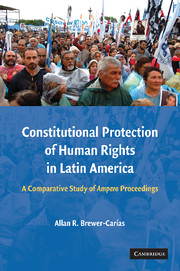 Constitutional Protection of Human Rights in Latin America
Constitutional Protection of Human Rights in Latin America Book contents
- Frontmatter
- Contents
- INTRODUCTION
- PART ONE THE CONSTITUTIONAL AND INTERNATIONAL DECLARATION OF HUMAN RIGHTS AND ITS JUDICIAL GUARANTIES
- PART TWO THE AMPARO AS A LATIN AMERICAN CONSTITUTIONAL AND INTERNATIONAL LAW INSTITUTION
- Chapter Three Judicial Review and Amparo Proceedings in Latin America
- Chapter Four The Amparo Action in Countries That Apply Only the Diffuse Method of Judicial Review of Legislation
- Chapter Five The Amparo Action in Countries that Apply Only the Concentrated Method of Judicial Review of Legislation
- Chapter Six The Amparo as a Constitutional Right in Countries with Mixed Systems of Judicial Review of Legislation
- Chapter Seven The Amparo as a Constitutional Guaranty in Countries with Mixed Systems of Judicial Review of Legislation
- Chapter Eight The American Convention on Human Rights and the Internationalization of the Amparo in Latin America
- PART THREE THE INJURED PARTY AND THE CONSTITUTIONAL RIGHTS PROTECTED BY MEANS OF THE AMPARO PROCEEDING
- PART FOUR THE INJURY, THE INJURING PARTY AND THE INJURING ACTS OR OMISSIONS IN THE AMPARO PROCEEDING
- PART FIVE THE EXTRAORDINARY CHARACTER OF THE AMPARO PROCEEDING
- CONCLUSION
- APPENDIX A List of Latin American Constitutions
- APPENDIX B List of Latin American Amparo Laws (Statutes)
- INDEX
Chapter Four - The Amparo Action in Countries That Apply Only the Diffuse Method of Judicial Review of Legislation
Published online by Cambridge University Press: 08 August 2009
- Frontmatter
- Contents
- INTRODUCTION
- PART ONE THE CONSTITUTIONAL AND INTERNATIONAL DECLARATION OF HUMAN RIGHTS AND ITS JUDICIAL GUARANTIES
- PART TWO THE AMPARO AS A LATIN AMERICAN CONSTITUTIONAL AND INTERNATIONAL LAW INSTITUTION
- Chapter Three Judicial Review and Amparo Proceedings in Latin America
- Chapter Four The Amparo Action in Countries That Apply Only the Diffuse Method of Judicial Review of Legislation
- Chapter Five The Amparo Action in Countries that Apply Only the Concentrated Method of Judicial Review of Legislation
- Chapter Six The Amparo as a Constitutional Right in Countries with Mixed Systems of Judicial Review of Legislation
- Chapter Seven The Amparo as a Constitutional Guaranty in Countries with Mixed Systems of Judicial Review of Legislation
- Chapter Eight The American Convention on Human Rights and the Internationalization of the Amparo in Latin America
- PART THREE THE INJURED PARTY AND THE CONSTITUTIONAL RIGHTS PROTECTED BY MEANS OF THE AMPARO PROCEEDING
- PART FOUR THE INJURY, THE INJURING PARTY AND THE INJURING ACTS OR OMISSIONS IN THE AMPARO PROCEEDING
- PART FIVE THE EXTRAORDINARY CHARACTER OF THE AMPARO PROCEEDING
- CONCLUSION
- APPENDIX A List of Latin American Constitutions
- APPENDIX B List of Latin American Amparo Laws (Statutes)
- INDEX
Summary
The first case refers to the amparo action in countries that only have a diffuse system of judicial review, as is the case of Argentina, which is the only Latin American country where the diffuse method of judicial review remains as being the only one functioning in order to control the constitutionality of legislation, and where the amparo and habeas corpus actions are also conceived as essential adjective tools for such judicial review.
The Constitution of Argentina in an article included in the constitutional reform of 1994 establishes the three specific actions for human rights protection: the amparo, the habeas data and the habeas corpus actions (Article 43).
Regarding the amparo action, the constitution provides that any person may file a prompt and summary proceeding against any act or omission of public authorities or of individuals for the protection of the rights and guaranties recognized by the Constitution, the treaties or the statutes, which can only be brought before a court if there is no other more suitable judicial mean.
The same Article 43 of the constitution also provides for a collective action of amparo that can be filed by the affected party, the people's defendant and nonprofit associations, in order to protect collective rights, like the rights to a proper environment and to free competition, and the user and consumer rights, as well as the rights that have general collective impact.
- Type
- Chapter
- Information
- Constitutional Protection of Human Rights in Latin AmericaA Comparative Study of Amparo Proceedings, pp. 92 - 101Publisher: Cambridge University PressPrint publication year: 2008


